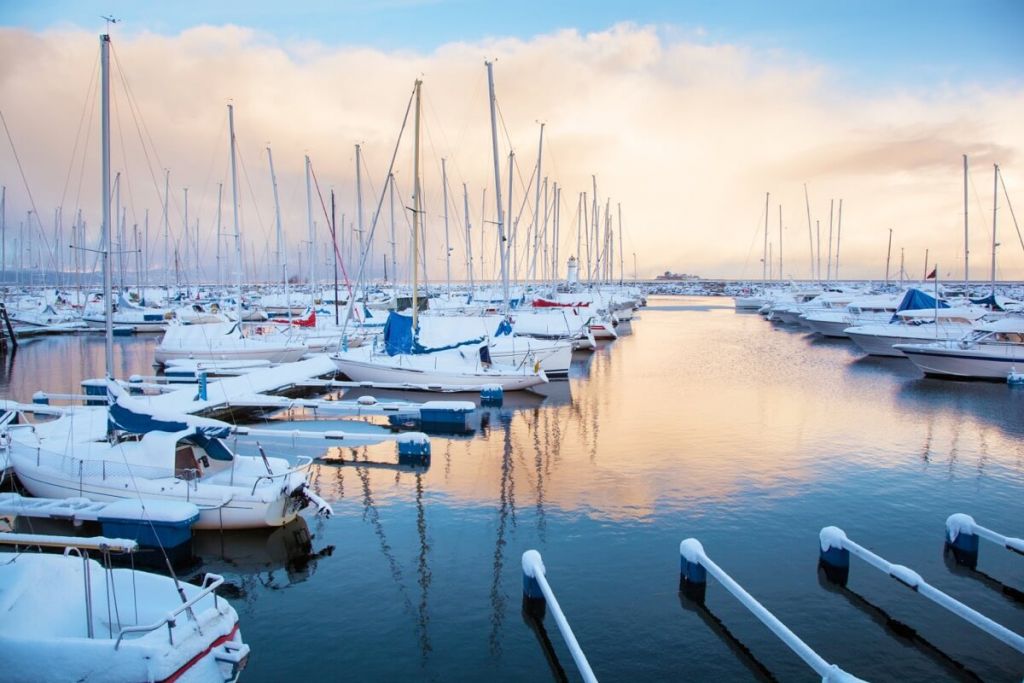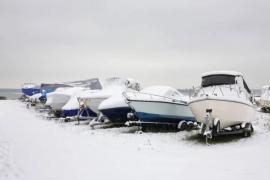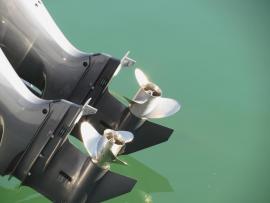If You Don't Winterize Your Boat, Here's What Happens
If you live where it drops below freezing and your boat is more complex than a dinghy, you need to winterize. Failing to winterize can cost you money and time with avoidable repairs and make you miss the start of the boating season. I'll make a confession up front - I damaged my first boat by not winterizing properly. You'll want to learn from my mistakes.
What happens if you don't winterize your boat? Water freezes and expands and can damage anything it's trapped inside. Water may seep into unprotected spaces to do this. Corrosive wastes and salt buildup can damage engines. Fuel can break down, and mold and mildew can take root. Multiple system failures may occur, rendering the boat unusable in spring.
System by system, there's a lot that can go wrong, and most of it is about water freezing where it doesn't belong. Below, I'll go over each potential complication in depth.
Summary
- Not winterizing your boat can cause water damage, corrosion, fuel breakdown, and mold growth.
- Proper winterization of your boat can save you money in the long run.
- The benefits of winterizing include preventing engine damage, protecting the hull, and ensuring the boat is ready for use in the spring.
- Winterizing involves several steps, such as draining the water system, protecting the engine, and storing the boat properly.

On this page:
Why Winterize Your Boat?
Winterizing your boat protects it from damage caused by freezing temperatures, moisture, and other environmental factors. It prevents engine damage, protects the hull, and ensures that the boat is ready for use in the spring.
Prevents engine damage: If water is left in the engine block or cooling system, it can freeze and expand, causing cracks and other damage. Winterizing the engine involves draining all the water and replacing it with antifreeze to prevent freezing.
Protects the hull: When water freezes, it expands and can cause damage to the hull. Winterizing involves removing all water from the boat to prevent this from happening.
Saves money: Winterizing your boat can save you money in the long run by preventing costly repairs due to damage caused by freezing temperatures.
Ensures readiness in the spring: Properly winterizing your boat ensures that it is ready to use in the spring without any issues. This includes protecting the battery, fuel system, and other components from damage.
What is winterizing?
A step-by-step description of winterizing is beyond this article, but an overview may help you see how failing to protect your boat during the offseason can hurt you.
Winterizing includes most of the following, though the exact list will depend on your boat and there may be additional tasks.
- Draining everything that holds water, from plumbing lines and tanks to engine blocks and cooling systems.
- Flushing everything out that comes into contact with salt water.
- Adding non-toxic antifreeze to everything that held water, including plumbing, toilets, fixtures, engines, and bilges.
- Changing oil in engines and fogging them with oil.
- Draining gasoline tanks and/or treating with stabilizer
- Filling diesel tanks and treating with antimicrobial stabilizer
- Disconnecting batteries and charging them (lead acid) or discharging them to 50% (LiFePO~4~).
- Covering the boat or moving it indoors.
With all that to do, what could possibly go wrong?
If you want to get a complete checklist, check out our Ultimate Winterization Checklist here.

Do You Need To Winterize Your Boat? — It Depends
Your Engines
Cracking and breaking
Raw water and fresh water cooled engines where the seawater lines are not drained can suffer from cracked parts; anything from heat exchangers to the engine block itself could crack and split open. Salt water will freeze, albeit at a lower temperature, and expand into closed spaces. If you are lucky, you’ll only blow a hose off its fitting or split it open; at worst, you'll destroy the engine.
Freshwater cooled engines with inadequate anti-freeze can also freeze and crack. If only water is used for cooling, the risk is much higher. A mix of anti-freeze and water can prevent this.
Corrosion and dirt
Dirty oil contains acidic contaminants, and salt can cause a host of problems with corrosion. Leaving unchanged oil and an unflushed engine may not break your engine right away, but it can cause damage that may shorten the life of your engine or reduce its efficiency. Cleaning and fogging engines reduce these risks.
Mechanical systems left sitting with corrosive waste products and dirt on them will suffer from it. Even if you are bringing your boat into a heated garage for the winter, the lack of motion in the engine can cause buildup and problems where that waste sits if the oil isn't changed and the engine flushed.
Fuel problems
Over time, gasoline degrades as different weight compounds separate and evaporate. If you have ethanol in your fuel, it can absorb water if left for the winter. Unstabilized fuel can lead to gumming, deposits, dirt in the engine, and difficulty starting and running.
Diesel has different risks; algae can grow in it and cause clogged filters and injectors. Dirty filters will grow and clog. Tanks left almost empty or half full are more prone to biological growth than tanks filled with biocide-treated fuel.

Do You Have to Winterize an Outboard Motor?
Plumbing
Water left in hoses leads to burst lines; water left in shower and sink fittings results in cracked and destroyed fixtures over the winter. A pump that isn't left dry will break if it freezes up or chew itself up if activated while frozen. Holding tanks that aren't emptied may freeze and expand, and the waste may dry out and solidify over the winter.
Hot water tanks and heat exchangers face the same risks of water expansion and cracking of tanks and heating elements if not winterized. Fixtures left closed with water in them may freeze and break.
One fall, I winterized my freshwater system but did not run anti-freeze through one showerhead in my boat. I'd done the sinks, but I forgot one shower. The hard-to-find and expensive Swedish fitting split open during the winter because I'd failed to get all the fresh water out of the inside of the shower mixer.
Batteries
Lead-acid
Batteries are an oft-neglected risk area in winterizing. Lead-acid batteries like flooded wet cells, AGM, and Gel will self-discharge over time. Batteries that are not fully charged at the start of winter may completely be discharged before the spring, which can damage a battery’s life span.
The chemistry of batteries causes a much lower freezing point for charged batteries than for discharged batteries. Discharged batteries freeze at a temperature not much lower than water. Even if it doesn't crack the battery case, freezing may cause internal damage to the lead plates, which kills the battery or reduces its life or capacity. The risks are highest for flooded cell batteries, but any lead-acid battery can freeze.
Failure to disconnect all loads from the battery will discharge it, and leaving a discharged lead-acid battery in a freezing storage area is a certain recipe for damage.
Lithium
Lithium Iron Phosphate (LiFePO~4~) batteries have different storage issues from lead-acid, as they should be stored at 50% discharge with all loads disconnected. Storing lithium batteries fully charged or discharged may affect their longer-term life cycle length and charge capacity.
While lithium batteries will not freeze like lead-acid, their performance degrades at low temperatures, and charging a LiFePO~4~ below 32°F (0°C) may damage the batteries.
Deck Fittings and Hardware
Water seeps in everywhere on a boat. An uncovered boat with snow and ice piled up on the decks may let water in through deck fittings, stanchion bases, and other areas exposed to the elements. At the risk of sounding repetitive, water that gets into tight spaces and freezes can cause damage through expansion.
The deck areas around fittings may develop cracks, and water can seep below and behind expanded openings and cracks. Water can seep into windows, between window seals, or between the window and the hull to cause damage and further leaks.
Mold, Mildew and Dirt
An unventilated boat will trap moisture, leading to mildew, mold, and rot. Left alone and sealed for the off-season, a boat may become a riot of mildew and bad smells by spring. While mechanical risks to systems are low, upholstery, curtains, boat canvas, and sails are all at risk from trapped moisture.
An uncovered boat will accumulate dirt over the winter. If you're unlucky enough to have storage near trees, you may find brown stains, filth, a cockpit full of rotted leaves, and a stained deck in the spring. Even without trees, atmospheric buildup from air pollution and rain will leave a patina of dirt and grime on a boat left uncovered for the winter.
Frozen Bilge
A frozen bilge can sink your boat if you leave enough water in it at the end of the season. If through-hulls are in the water and it freezes, they can get cracked or damaged, which is terrible below the waterline. If your boat has a hull plug for draining, ice in the bilge could force it out or loosen it.
Bilge pumps in frozen water do not fair well. If they are run while frozen, they are likely to get damaged, and expansion and crushing forces from water can break the casing or damage the pump mechanism.

Do I Need to Winterize an Indoor Stored Boat?
Avoiding Spring Disasters
This is a list of what could happen if you don't winterize, not what will. Your boat is a complex machine, and a lot can go wrong fast in freezing weather if you don't take care of it, but you can get lucky.
In the spring, inspect everything carefully. You can't tell if something has frozen and thawed, but you can see visible damage. If you didn't winterize, be prepared for surprises when you commission things. I found that broken shower mixer in the spring when I pressurized my water to flush the system, and it started spraying water all over the forward head.
If you think you missed winterizing something, inspect it closely before trying to use it.
Better still is to make a good fall checklist and do the work yourself well before the risk of a freeze, or hire someone competent to do the work you don't feel comfortable with. With winterizing, an ounce of prevention is cheaper than a few pounds of cure in the spring.
Did you find the answer to your specific question?
👍 4 👎 0
Comments
Penelope Smith
My father would like to get a good boat to use. It is nice to know that it would be smart to make sure that your bilge doesn’t freeze. It does does seem like a good thing to get a professional to help with getting the boat ready for winter. It might also be smart that during that time they should look into their stabilizer.
Thomas Clarence
I found it interesting when you explained that you need to make sure that a boat is ventilated properly during winter so that moisture doesn’t get trapped and cause mildew. Would it be a good idea to store a boat in an outdoor self-storage facility? An outdoor facility storage seems like a good way to keep a boat from accumulating moisture. https://www.kochstministorage.com/our-services
Deanna Lynne
Thanks for mentioning that it’s important to cover the boat or move it indoors before winter. Additionally, it’s important to get a high-quality canvas cover for your boat to make sure it’s secure and protected. You can even look for factory-direct replacement boat canvases to save money! https://searaycanvas.com
Amy Saunders
Oh wow, I never knew that we can protect our motor engine from corrosion by applying a thin layer of special oil on it. It’s been a while since my father-in-law last used his motorboat and he wants to use it during the winter. I guess he should send it for a maintenance very soon. http://www.allseasonshonda.net/outboards
Leave a comment